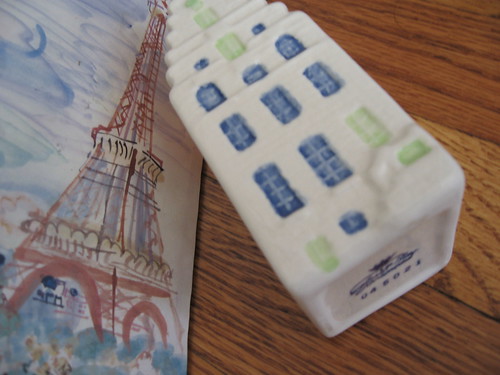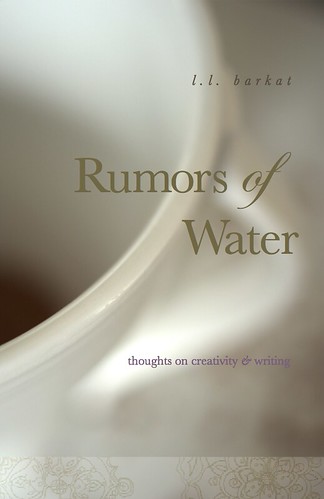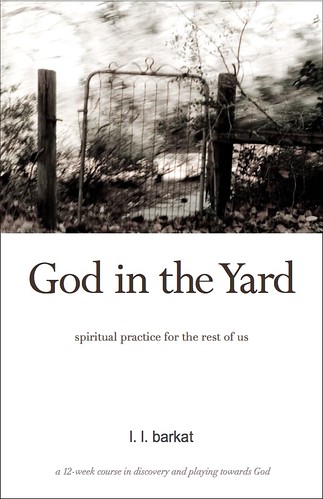Souvenir

Betty Spackman compares 'souveniring', taking home a kitschy porcelain reproduction of Niagra Falls after a trip to Canada, for instance, to the process of naming. Souvenirs, artless as they may be, help us to "own a place or an experience which is otherwise too big to carry away and too expensive to possess in any other way." (p.78, A Profound Weakness)
The souvenir's value is not in its artfulness, but rather in its ability to spark our memories of a place — just as a name brings to mind our memories and experiences of a person.
I remember that the God of Israel refused to let his people make an image of him, an idol, a souvenir. For while such images could be a memory catalyst, they could also be reductive. Niagra Falls is not a blue painting on porcelain. Holland is not a wooden shoe with a red tulip on the toe. God, likewise, cannot be pressed, minted, captured, pocketed.
And yet God chose the incarnation — the Great "I Am" (no name could capture God) stepped into a fleshy pocket of time and space…became a souvenir we could carry off, to burn a hole through our shelves, to set a tidy existence on fire.
Paris and Holland Souvenirs photo by L.L. Barkat.
Seedlings Invitation: If you write a post related to this post and Link It Back Here, let me know and I'll link to yours.
RELATED:
Sandy's Concord and Providence, a poem on naming.
Labels: A Profound Weakness, art, Betty Spackman, kitsch, mercy















26 Comments:
L.L., Yes, I remember souvenirs we had when we went to New York City and the World's Fair in 1965, and Florida in 1969, though most of the souvenirs we brought home on that ride were fresh oranges that to me were out of this world. And we smelled like oranges for awhile.
Interesting thoughts here. It is quite interesting that God understandably would not let images of him be made. Of course humans could not have invented Jesus. Maybe that's the point: God knew humans needed to wait on Jesus before they could actually see God.
I like the spiritual lesson here... not reducing the Great I Am to kitsch.
But I'm not sure I understand the last paragraph about burning a hole through the shelves, etc.
I agree. God cannot be reduced to an item. But God did call on the Israelites to remember His deeds. So don't you think some of them carried around souvenirs of those things? A brick from the wall of Jericho. A matchbook from the wedding in Cana. Stuff like that.
My kids came home from Sunday School yesterday with rocks -- big, 5-pounders from the beach, painted with sparkly paint. The lesson was Joshua, and with a bit of proding, they remembered it was about crossing the Jordan, and bringing up twelve stones for a memorial. Kind of a souvenir, no?
i never thought about a souvenir this way, but it makes sense. They don't define something, but they can spark lovely memories.
The problem with God is he's not a memory.
I've tried keeping keepsakes of times God has worked in my life. Sometimes they remind me of how he was faithful, and since his character is unchanging, how he is faithful.
Sometimes they take up room in boxes.
Sometimes they make me jealous for another time in my life.
Ted... Oh, I do love the edible souvenir. And I guess we Christians have that too, in the communion elements.
Craver... sorry I got carried away with the metaphor. See, we usually set our souvenirs on some tidy shelf. But God, though he came in a physical "package", a souvenir of sorts, surely doesn't sit on the shelf the way an ordinary souvenir does. He is dynamic. Firey. And brings change.
A Musing... what a great picture. It reminds me of Mark Twain's Jerusalem chapter in Innocents Abroad. Of course he had a little contempt for the practice of relic keeping, but one can see how it could have an attraction.
Maria... the interesting thing about Judaism was that it forbid images of God, yet it encouraged a physical faith. I often think this was partly to include the children in what can otherwise be a very abstract experience. The Passover elements for instance are quite concrete, unchangeable. They tell a story to the generations.
Heather... I suppose he is not a memory. Just as I am not a memory. But my image in a photo, or my name on someone's tongue does elicit some kind of memories, yes? I'm still playing with your thought here.
This comment has been removed by the author.
Thanks for that thoughtful post. I don't have much to add (am in absorbing mode these days) but just wanted to say it did make me think:)
And Sonia's psychadelic fan photo (from a couple of posts back) is awesome!!
"stepped into a fleshy pocket of time and space…became a souvenir we could carry off, to burn a hole through our shelves, to set a tidy existence on fire."
Awesome....I forgot to add "the written word" to the list of the arts that are highly valued in the spiritual value system... You've reminded me. Thanks!
Wonderful insights here, everyone.
This post really struck me since I am in a very memorial-making place in life this week (a death in the family). What can you take away to remember a place, an event, a person? Because this week, I really really want something to hang on to. I find myself not wanting to leave the funeral home. I want to eat, sleep, converse, laugh, cry... everything... in the presence of the body of this man that I loved.
What would truly capture the essence of the landscape, the experience, or the relationship? I can't think of anything that would accurately portray the thing, except for the thing ITSELF.
Which is what makes the Holy Spirit such a wonderful gift! As Christians, we don't carry around a pocket-sized Jesus to gaze at in fond remembrance of what "used to be." We live in relationship and nearness to the very "thing" ITSELF. Awesome thought! Only God can do that.
I've also been reflecting on the memorials I make of God's actions in my life. Like the children of Israel I have gathered stones of praise and worship, altars of remembrance for what God has done and who He is. My brain, however, does not function in a way that I remember so much the specifics of each and every stone... which began to make me feel like a loser when I discovered that. Until I realized that each of those "stones" is stacked upon another stone, upon another, upon another. My stones and memorials build a foundation for my faith. Working in unison, remembering all the acts of God in my life brings me up out of the shifting sand and anchors me on a solid foundation.
I don't feel so bad now, that I can't remember each and every event in complete detail. I'm just grateful to know the foundation is there and that it's getting taller and broader over time. God will remind me of the specifics when I see Him face-to-face. ;)
physical idols - or idols of the heart?
Boy souvenirs are dangerous for me. They can get out of hand so quickly. I can buy into the idea if I were to bring no more than one souvenir a year. And if I were to get rid of the ones that stopped being meaningful.
My daughters, on the other hand, would like to bring home about 5 souvenirs a day. That adds up quickly. One of my family roles is gently policing the artifacts, trying to keep our house from turning into a crowded museum.
I love this bit: "The souvenir's value is not in its artfulness, but rather in its ability to spark our memories of a place."
While we are commanded not to direct our worship toward idols or graven images, I love how the OT is sprinkled with examples of the faithful erecting altars to commemorate great acts of God; God even commands the faithful to erect these monuments in His honor. I know there are more, but two come to mind immediately ...
In Genesis 35, God commands Jacob to build an altar at Bethel to mark the fact that God had delivered him when fleeing from his brother Esau.
In 1 Samuel 7, Samuel builds an altar, calling it Ebenezer in remembrance of the fact that God had delivered & given Israel victory over the Philistines.
Though we are not to direct our worship toward these things, it seems that externalizing these moments, making souvenirs or creating tangible remembrances of them is not what is forbidden. If the thing, however crude a representation of what God has done, ultimately calls our remembrance to who God is, what He has done, etc. ... I think God is glorified by such things.
And so the Word became flesh & dwelt among us. I love it ... Jesus -- a souvenir of God.
LL
What a great post - I like what you said about the reductive nature of images... that's the problem with idolatry, isn't it?
But as you pointed out, the Son is the perfect image of God.
I like this post a lot, too. It reminds me of the biggest danger of Christian publication (or any "Christian" business, art, etc.) Scott Derrickson calls it "Godsploitation."
Turning God into a souvenir is a good way of thinking about it too. We shrink him down and carry him in our pockets for awhile. Yikes. It's a scary analogy because it's so easy to do.
It's such a good reminder. I was going to say "He's not a TAME lion," but that quote alone has been overused and tames Him, I think.
I guess this was the Reformers' aversion to church imagery, too.
On the other hand, I think sometimes even a souvenir of God isn't a bad thing--if it truly puts us in mind of Him, in order to, say, burn a hole through our shelves--as long as it doesn't become a substitute.
This post drew my mind back to a post you wrote a few weeks ago about how we try to capture things in nature through creating or taking a photo or taking a remembrance in nature (such as a stick or stone) from that place. At least, I think I'm remembering the essence of that post that sparked a lot of good conversation. ;)
From what I remember, the post was saying that perhaps doing so limited or diluted or minimized the essence of the thing itself, that our creations in response can never live up to the thing itself. (My apologies if I'm totally turning your words or the ensuing discussion into something it never was!)
Anyway, this post seems to give a counterbalance to all those ideas that flowed forth in that other discussion.
There. That was a mouthful just to share a simple thought! :)
Oh, and I must say that Erin's comment particularly edified me. I've been thinking and feeling on death these days, too, and exploring how to express it. It seems all around in the blogosphere these days, too, so many people's experiences tending that way all of a sudden. Or perhaps not all of a sudden, since it is so often with us all the time.
Ini... if we can just think together, that alone is worth coming together.
Kim... nice to think that writing is a form of spirituality! Or can be.
Erin... Again, I want to say that I'm so sorry about your loss. And, yes, nothing really "does" except the thing itself. On a different note, I love all that stuff about the stones. Someday, when my book finally comes out, I may have to point back to your wonderful discussion here. After all, I use the idea of stones too, though I use it as the idea of crossing life and you use it as a foundation.
Halfmom... I suppose that one could lead to the other or vice versa, no?
Real Live... a souvenir cowboy. What a vision I have of you now!
Kirsten... the Word becoming flesh, a souvenir of God, really is a radical idea, isn't it? Maybe that's part of why the religious community at the time kept calling Jesus a blasphemer.
Every Square... and I find myself wondering how He did that so successfully... bundled himself into flesh without reducing his essence.
Mark... it seems to me that if we can carry a God souvenir in our pockets without feeling the heat of Him, then perhaps we have picked up the wrong souvenir.
Jenn... what I like about Betty Spackman's discussion of images is that she suggests they aren't as controllable as text. And, in that way, oddly, I think that images might actually be less reductive of God than text... just thinking here.
Christianne... yes. I think the thing that struck me about Spackman's thoughts was that the souvenir does not pretend to be the thing itself. It serves as a pointer of rich, deep memories. So, in relation to God, I suppose this means that if we only cling to the "souvenirs", the "artifacts", without having a memory or new experience called up, then we've missed the point.
Laura, I love the visual metaphor here—beautiful and scary.(For some reason reminds me of a Chris Van Allsburg book.)
To think: He lives in us, makes his home in us, this good shepherd—this tempest!
Sometimes these souvenirs are scars of the past, reminders we made it through.
There is a passage in Shakespeare's Henry V that I memorized some time ago that reminds me to strip my sleeves every once in a while and remember.
"He that shall live this day, and see old age, will yearly on the vigil feast his neighbours, and say 'To-morrow is Saint Crispian.'Then will he strip his sleeve and show his scars, and say 'These wounds I had on Crispian's day.'And gentlemen in England now-a-bed Shall think themselves accurs'd they were not here, And hold their manhoods cheap whiles any speaks that fought with us upon Saint Crispin's day.
I also think of the marks (souvenirs?) that Jesus bears on His hands and feet—that He still proudly wears to remind us of His limitless love.
L.L., Interesting tie you bring with communion. I guess I'm basically low church evangelical, yet wanting to see by the Spirit more in communion than rememberance only, because I believe scripturally there is more there.
To see this as Christ's body and us in his body, broken and bleeding for us that we might be made whole, one and healed.
We certainly need it as a reminder as well.
This is lovely. All language is reductive by its nature. Perhaps through the ages the great poets and storytellers have been revered because their words have illuminated nuances that suggest more and more and more.
(Thanks for linking my poem. I am honored.)
L.L., we've either picked up the wrong souvenir or we've picked up the wrong god.
23... I'm curious. What do you find frightening about it? And I love that reference to the scars that remain, as a sign, a calling up of what came before (and indeed is still active in its work).
Ted... a very interesting response. I hadn't considered that one can remember without engaging in communion. But I suppose that's possible. For me, the remembrance would also hopefully be to initiate communion.
Sandy... which makes me think it's good to read the bible in different translations, even different languages if we can. And also to engage with our diverse brothers and sisters in Christ, to receive the fullest picture we can. Oh, and your poem? I really loved it.
Mark... Well said.
L.L., Isn't it interesting how dead a word can become and emptied of meaning altogether over the years! Having gone to church all my life, communion to me was just another boring part of it growing up. And I don't see it as being that greatly significant to most Christians I've known over the years, including myself.
But you bring up the point that it is possible for one to remember without communing or communion. So very true. I do think this participation in the body and blood of Christ that goes on in this practice has an aspect of communion with God, with Christ by the Spirit, as well as a communing with each other- in the reality of our union together in Jesus.
We were cleaning the little girls bedroom the other day and Faith wanted to keep it all. Bird feathers, scraps of paper, broken toys...because they all hold memories. She settled for taking pictures of them.
It's interesting that Jesus left nothing behind. No bones, no house of flesh. Likewise, God hid the remains of Moses. Otherwise the temptation would be to worship the souvenirs and not the Savior. We do not need such reminders for we have the great I Am housed within our very being.
Kate
Oh this is SO thought provoking--mostly on the secular side. I often have to fight my urge to take pictures and just enjoy. . . .Pictures and souvenirs do not really bring to mind the real memory. I'm going to think about that in terms of my spiritual identity as well.
Post a Comment
<< Home